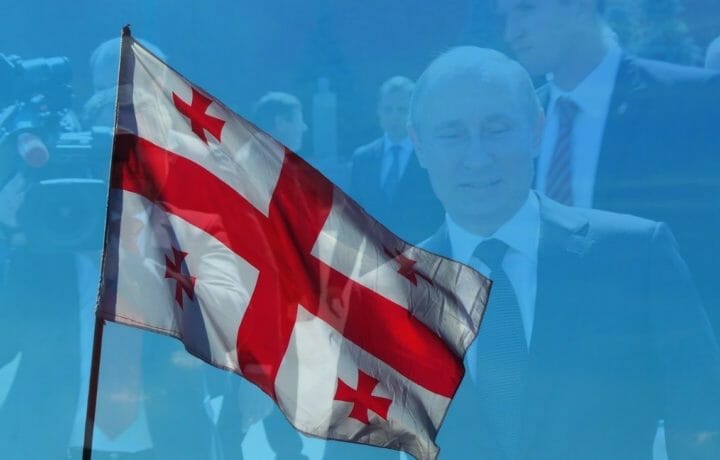In what can only be described as odd, the foreign intelligence service (SVR) of the Russian Federation sent an unambiguous message via a public démarche to the United States to keep their distance when it comes to the affairs of Georgia on March 9.
Démarches between countries are not unusual. What makes this démarche especially noteworthy is it came from the SVR and not the Ministry of Foreign Affairs or the Kremlin. This has happened only once previously, and it was with respect to Moldova in 2020.
The Russian preemptive action no doubt is being driven by the fact that the Secretary of State, Antony Blinken, has a much different view towards Russia, one steeped by his own professional experiences. Blinken has stated publicly that he believes Russia continues to be aggressive toward countries who are not under the protective security umbrella of NATO and that “there is sufficient evidence” for Georgia’s joining NATO.
The Russia démarche
The missive from the SVR, “On the approach of the U.S. administration to the situation in Georgia” was published on the SVR website on March 9 and comes from the Director of the Foreign Intelligence Service, S.E. Naryshkin. Key points Naryshkin makes are:
- U.S. special relationship with Georgia dates back to Saakashvili’s days
- Accuses the United States with manually “managing political processes in Georgia”
- Accuses the administration of having a “plan to provide support to the opposition to the Georgian Dream Party
- Accuses the administration of building a coalition within the European governments and the expectation that any government in “Tiblisi will be determined by the readiness of the Georgian leadership to precisely follow American instructions.”
- Accuses the elites within Georgia of saddling up next to Washington leads to “the loss of de facto sovereignty” both domestically and abroad.
“It is common for SVR to make statements accusing United States of interference in Russia’s internal affairs but rare to see SVR issuing a press release accusing U.S. of interfering in other countries. That rhetoric is usually left to Kremlin officials and propaganda outlets. SVR issued a similar press release last year during Moldova elections in support of their candidate running for re-election, Igor Dodon. While Russia warned US to stay out of Moldova’s affairs, they were playing a very active role in support of their favored incumbent candidate Dodon. ” remarked noted researcher on Russia foreign affairs and corruption, Olga Lautman.
She continued, “There was also no evidence of Washington’s involvement but as with everything else, the Kremlin is always quick to accuse U.S. of what the Kremlin is involved.”
Georgian minister of parliament, Giorgi Kandelaki noted in a Tweet, the statement is a de facto admission of SVR backing of Georgian Dream.
In an unprecedented statement, Russia's Foreign Intelligence Service – the SVR – backs Georgian Dream, alludes to its 'resistance to Washington' and cautions western support for Georgia's opposition. It gambles on western fear that pressing Ivanishvili may undermine Georgia. pic.twitter.com/f16EP7TvDz
— Giorgi Kandelaki (@kandelakigiorgi) March 9, 2021
Georgian Dream party
The Georgian Dream party, founded in 2012 by Georgia’s richest citizen, billionaire Bidzina Ivanishvili, won the October 31, 2020 election in what can only be described as a highly contested election. The party, lead by Irakli Kohahidze won 48.1% of the vote of the 150 seat parliament and formed the government. The European OSCE noted that the conduct of the election included “pervasive allegations of pressure on voters and blurring of the line between the ruling party and the state.” While the party has been at the helm over the last eight years, the country’s economy has dwindled.
Russia-Georgia dynamics
The Georgian Dream party is also more pro-Russian than the opposition, specifically the United National Movement (UNM), who fielded former Georgian president Mikhail Saakashvili as their candidate for prime minister in the 2020 election. The animus toward the the UNM by Russia can be directly tied to the 2008 conflict between Russia and Georgia which resulted in Georgia losing two Russia-friendly regions.
The U.S. Department of State has noted a bevy of Human Rights abuses, as evidenced in the 2019 Country Report on Human Rights Practices in Georgia. Noteworthy is a call-out on the de facto authorities in the Russian-occupied regions of the country having committed arbitrary and unlawful killings. In addition, 16 NGOs complained on the Georgian Dream party’s efforts to influence the judicial system.
“I find it odd and troubling that a nation’s intelligence service – especially one associated with murdering its own citizens – would issue a public démarche. I do recall from my experience with Russian intelligence and national security professionals that they have an emotional – and almost irrational – negative attitude toward Georgia,” said John Sipher, a former CIA station chief and co-founder of Spycraft Enterprises. He continued, “There were few things that could stir up their anger more than an issue associated with Georgia. While it is odd, as we go forward we should keep this in mind since it is obviously an issue of importance to the Kremlin.”
Thin skin indeed, as evidenced by Sipher’s observation, Putin opted to use his intel arm to send a message, perhaps because Secretary of State Blinken had already pressed Foreign Minister Sergey Lavarov on Georgia during their first bilateral telephone call, and considered the Foreign Minister’s engagement to have been ineffective.




